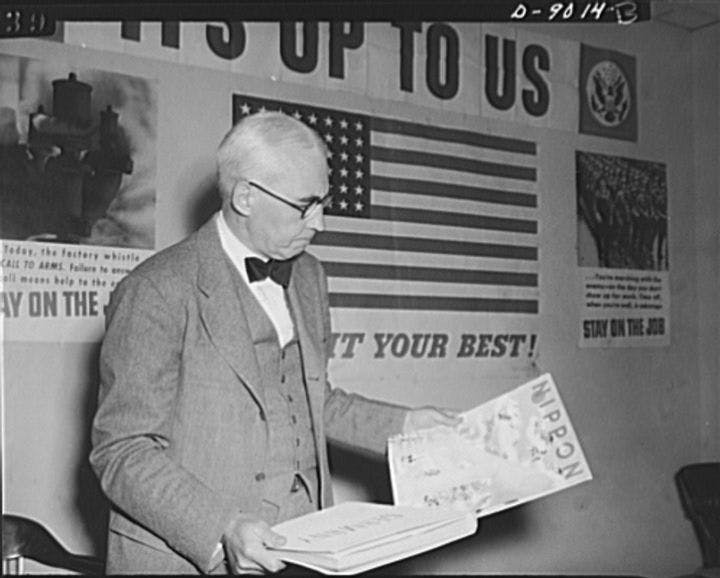Summer 2010
Literary Lobs
– John Brown
There was a time when the United States had no qualms about using books as “weapons in the war of ideas.”
Books and propaganda, for many Americans, don’t mesh. Books educate. Propaganda lies. But there was a time when the United States had no qualms about using books as “weapons in the war of ideas”—in the phrase made famous by President Franklin D. Roosevelt. In Books as Weapons, John B. Hench, a staff member of the American Antiquarian Society for more than three decades, recounts this chapter in America’s efforts to defeat the enemies of democracy during World War II.
In early 1942, the Council on Books in Wartime, a nonprofit corporation established by U.S. publishers, collaborated with the newly created Office of War Information (OWI) to disseminate works by American authors throughout Europe. This large-scale program, Hench writes, was meant to “win the hearts and minds of the people liberated from the Axis powers.” Selected titles ranged from policy treatises such as Carl Becker’s essay on the prospects for postwar reconstruction, How New Will the Better World Be? (1944), to sentimental novels including The Human Comedy (1943), William Saroyan’s tale about a California family during wartime.
Books were vetted by a convoluted bureaucracy, then printed—in English and also in translation—and distributed overseas. Crates of books bound for French bookstores arrived on the beaches of Normandy along with vital troop supplies. The process was a logistical nightmare, trying enough to “make even Job weep,” in the words of one program overseer.
Crates of books bound for French bookstores arrived on the beaches of Normandy along with vital troop supplies.
The military was eager to get books into the hands of another target audience—the 379,000 German prisoners of war interned in U.S. camps—“to calm the people who read them, to win their hearts and minds, and to cleanse them of Nazi, fascist, and militaristic thinking.” Favored titles included books by anti-totalitarian German authors Thomas Mann and Erich Maria Remarque, as well as German translations of American works such as Ernest Hemingway’s For Whom the Bell Tolls (1940).
In occupied Germany and Japan, America quite literally had a captive audience, and the military governments installed in these countries sought to make books available to win over the population. Though these efforts were stymied by postwar shortages and a reading public too poor to purchase books, Hench writes, they did introduce “a freer, more democratic system of publishing” in both Japan and West Germany, and helped make both countries “reliable” Cold War allies.
The campaign to sway minds didn’t end when OWI shut down after the war. A short-lived organization composed of publishing executives and supported by the State Department failed to gain traction, in part because of internal disagreements about whether its aim should be cultural diplomacy or simply increased foreign book sales. Still, American publishers’ wartime experience with overseas markets—in which they hadn’t been interested before—changed the face of publishing, much to the consternation of British booksellers who feared worldwide American competition.
For specialists in World War II propaganda, Hench’s meticulously researched monograph is a gem, but his attention to arcane detail may limit the book’s appeal. (He goes so far as to provide the dimensions and the grade—“basis 25 x 38–31#/500 white ground wood English finish”—of the paper on which overseas editions were printed.)
Hench ends by asking whether books should “become, once again, weapons in the war of ideas.” In fact, the U.S. government still uses books in public diplomacy programs (for example, at overseas State Department Information Resource Centers), but on a far smaller scale than during World War II or the Cold War. The printed word will doubtless survive as an instrument of America’s outreach to the world, but in our Internet age it is bound to play a far lesser role than it did in the 20th century.
* * *
John Brown, a former U.S. Foreign Service officer, teaches a course at Georgetown University on the history of propaganda and U.S. foreign policy and blogs at http://publicdiplomacypressandblogreview.blogspot.com/.
Reviewed: Books as Weapons: Propaganda, Publishing, and the Battle for Global Market in the Era of World War II by John B. Hench, Cornell University Press, 333 pp,
Photo courtesy of Wikimedia Commons
